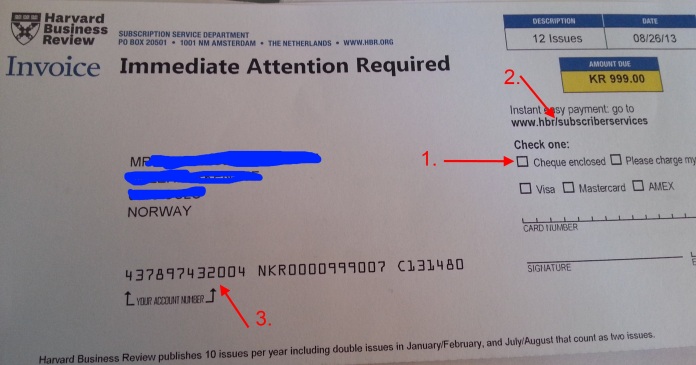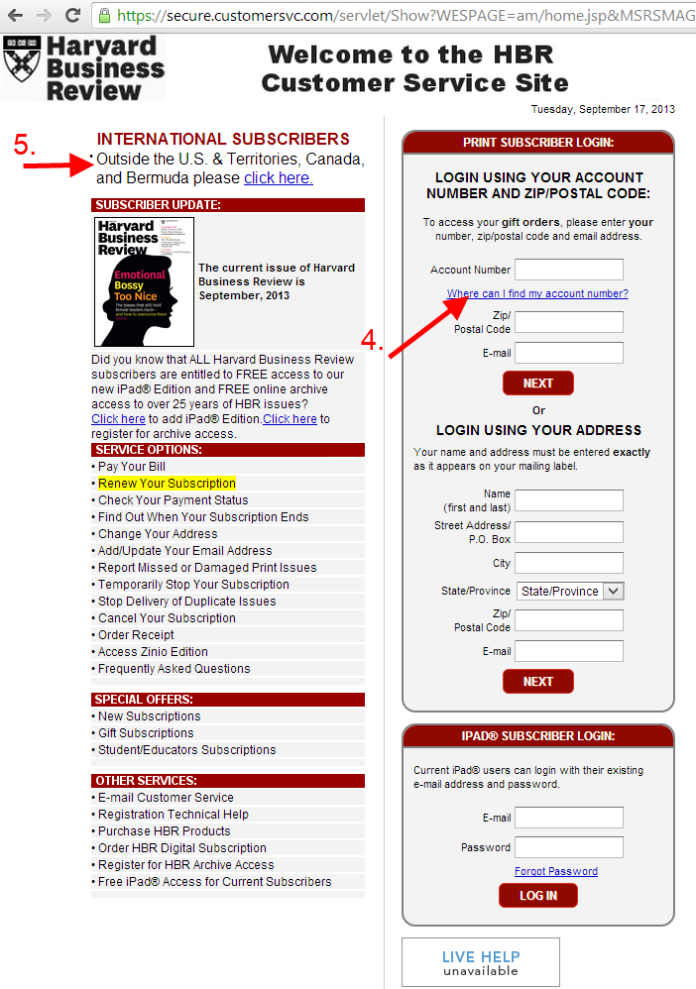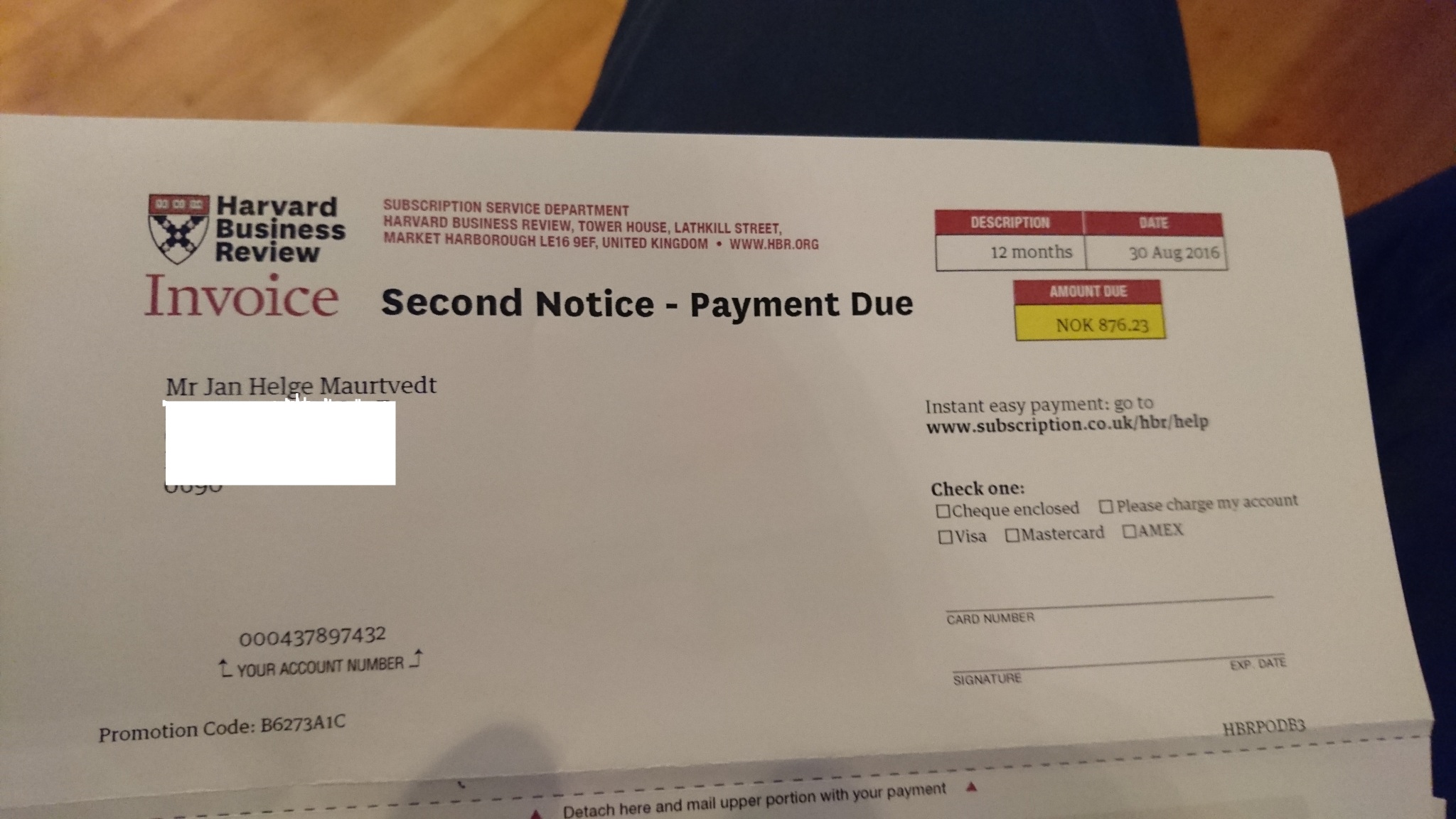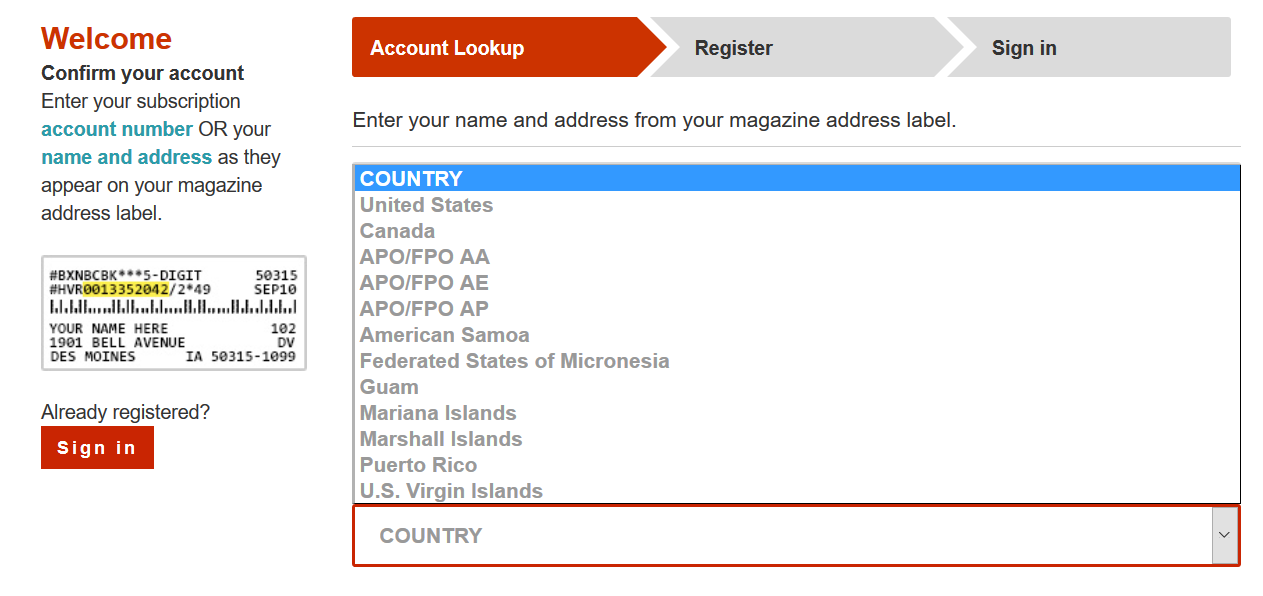I am a business oriented technology fan that likes to stay updated on the recent trends and research. HBR is perfect in that extent and I love the content.
I use Kindle on my cell quite a lot and read electronically, but I also love reading on paper – the tactile user feedback that paper gives me, the ability to take notes, fold corners and let my eyes rest while reading adds value to me. I also love great user experience. Especially it is important if you aim to target a group of busy business users and managers. I have enough time guided CEO and mid level managers through services that has been carefully designed with them actually in mind. Therefore I am utterly baffled with how crappy the subscription service user experience of HBR is – seen from Norway that is.
First, here is the invoice that I received, this is the third letter I receive that looks exactly the same except from the headline which is increasingly harsh.

#HBRFail1 – Pay option: Cheque enclosed

I am a 31 year old Norwegian.
I do not know what a cheque is,
I do not know how get hold of one, not to mention to complete one.
If I dig realy deep in my memory I think I saw my mom complete one when I was 8 years old.
That was back in 1990.
(As a sidenote, filling out my credit card info on a piece of paper and filing it to you by snail mail also feels a bit awkward, which is why I progressed electronically)
#HBRFail2 – Wrong URL

Last time I checked the TLD list, .hbr was not on the list.
#HBRFail3 – Unclarity whether my account number is 9 or 12 digits

As you will see below, this gives a cascading error when I try to log in.
Ok, I overcame these issues on the third letter, decided to give my MasterCard a shot online and actually managed to click myself into hbr.org/subscriberservices.
Actually a tiny kudos here, beause all these URLS work, it is just that none of them are atually printed on my letter:
I will get back to the latter four URL’S, but here are the landing page for hbr.org/subscriberservices

#HBRFail4 – Unhelpful help with the digit length
As I mentioned #HBRFail3, I was thrilled that there was a help file here that would help me answer whether 9 or 12 digits were right.
Unfortunately it does not serve that purpose as the account number in the picture is 9 digits and my number was 12:

#HBRFail 5 – Unclear call to action for international users

Did you see it before you looked at my arrows? Yeah, that is the link I was supposed to click.
Obviuosly I was a bit in the fog because it was my third letter of invoice and I had had the hassle of guessing the URL, and I was very eager to log in, but it would be easy to design the page so that International users actually saw the message. It fails the “dont use click here policy” also.
I did not find this link until I turned the letter over, found the phone number to the lovely gentleman Luke in the Netherlands, and made him a call. He was very nice and polite, but still made me embarrassed in a most pleasureable gentlemans way when he made me aware of the link.
Remember the URLs above? Actually the four latter ones send you directly to the international site, so why the heck did you not print one of those on my invoice in the first place? This might call for a separate error, but I’ll spare you.
Now onward, this is the error message I got when I tried to login – no wonder I did not concentrate on the link:

#HBRFail6 – Not provide the user with useful error messages
Remember #HBRFail3 and #HBRFail4? Well, I still could not log in with neither 9 nor 12 digits.
Since I had not received any e-mails regarding this invoice (it was after all third notice) I thtought that it might be they had the wrong e-mail adress for me.
Not a throught crossed my mind when I read that error message that I was on the wrong page until the kind Luke by phone from the Netherlands made me aware of the link and what I call #HBRFail5.
#HBRFail7 – Not able to process my MasterCard and to give me feedback about it
Finally, I have managed to log in (by clicking the link “click here” for, selecting my country and login in and calling luke). Now I happily entered my MasterCard number. I got the message that they could not use it.
I called Luke again (are you the only one in the Netherlands on the phone?). Nice, he knew my case from 2 minutes before, but still asked for my account number again (did you not register my phone number and have automatic popup/CTI Integration like most modern call centers?).
Well Luke told me that they had actually received my credit card info once earlier in May, but they were unable to process it.
Oh yeah, now I remember, on the first letter I actually tried the same route as above but never succeeded login in.
Therefore I (#facepalm for security in hindsight) sent my Mastercard number by mail. They had not been able to process it.
How about telling me? In the end I tried a different card, A VISA, with Luke on the line, and it worked.
Hopefully, I will get all my issues this year as well.
Thanks to Luke for being polite and helpful.
Thanks to the HBR editors for providing good insight and thoughts.
Warm regards
A true fan

 Cheque still an option, wonder how many people use it.
Cheque still an option, wonder how many people use it. Update: Obviously subscription services for international customers are outsourced to
Update: Obviously subscription services for international customers are outsourced to 
 Appears I have to call Luke again, since I cannot login. I am not even close at logging in. Tried to Sign Up at
Appears I have to call Luke again, since I cannot login. I am not even close at logging in. Tried to Sign Up at 












 Usually, in Norway, we refer to the red wing (meaning left and centre left) and the blue wing (meaning right and centre right). I have found that this red and blue notation meant little or nothing to Americans, and when I put the logos of the Republican party and the Democratic party next to each other I can see why.
Usually, in Norway, we refer to the red wing (meaning left and centre left) and the blue wing (meaning right and centre right). I have found that this red and blue notation meant little or nothing to Americans, and when I put the logos of the Republican party and the Democratic party next to each other I can see why.